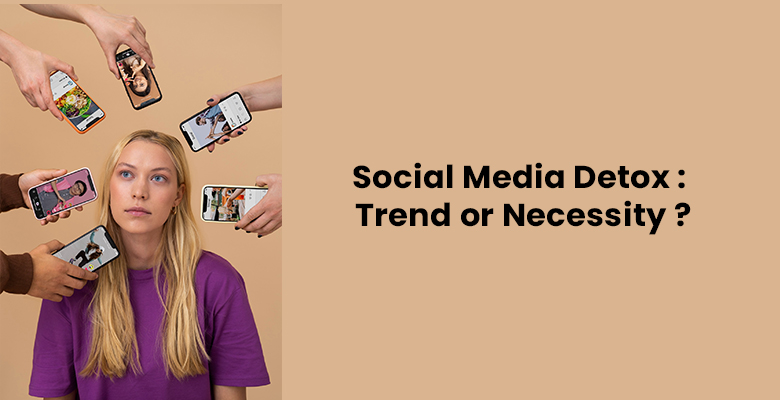
Today everything and everyone is digitally connected and social media has become an integral part of daily life for millions of people. Platforms like Facebook, Instagram, Twitter, and TikTok offer unprecedented ways to connect with friends, share experiences, and stay informed. However, as social media usage has surged, so have concerns about its impact on mental health and well-being. This has led to the rising trend of social media detox, where individuals temporarily or permanently reduce or eliminate their use of these platforms. But is this detox merely a fad, or is it a necessary step for maintaining mental health in the digital age? Read below Social Media Detox: Trend or Necessity?
How We Are Using Social Media
Social media usage has skyrocketed over the past decade. According to a report by DataReportal, as of 2024, there are over 4.6 billion social media users worldwide, spending an average of 2.5 hours per day on these platforms. People use social media for various reasons, including
- Connecting with Friends and Family
Social media makes it easy to stay in touch with loved ones, regardless of geographical distance.
- Entertainment
From viral videos to memes, social media provides endless entertainment.
- Information and News
Many people rely on social media for news updates and information on current events.
- Networking
Platforms like LinkedIn are crucial for professional networking and career development.
- Self-Expression
Users share their thoughts, photos, and opinions, crafting an online identity.
The Impact of Social Media on Us
While social media offers numerous benefits, it also has significant downsides that are becoming increasingly apparent
- Mental Health Issues
Studies have linked heavy social media use to increased rates of anxiety, depression, and loneliness. The constant comparison with others’ highlighted reels can lead to feelings of inadequacy and low self-esteem.
- Addiction
The dopamine hits from likes, shares, and notifications can make social media addictive. Users may find themselves compulsively checking their accounts, often at the expense of real-life interactions and responsibilities.
- Sleep Disruption
Excessive screen time, especially before bed, can interfere with sleep patterns, leading to insomnia and other sleep disorders.
- Decreased Productivity
Social media can be a significant distraction, reducing productivity at work or school.
- Privacy Concerns
The sharing of personal information online raises significant privacy and security issues.
How Does the Detox Works?
A social media detox involves taking a deliberate break from social media to mitigate its negative effects. This can range from a short-term break (a few days or weeks) to a long-term or even permanent disengagement from these platforms. This may sound a little difficult to do but you can follow a few steps to do it. Below is how a social media detox typically works-
- Set Clear Goals
Determine the length of the detox and what you hope to achieve. It could be reducing anxiety, improving sleep, or reclaiming time for other activities.
- Inform Your Network
Let friends and family know about your detox so they understand why you might not respond promptly.
- Remove Apps
Deleting social media apps from your phone can reduce the temptation to check them. For example, if you have this habit of scrolling Instagram for hours or chatting with someone over Telegram non-stop, you might want to delete these apps for a while.
- Find Alternatives
Engage in other activities like reading, exercising, or spending time with loved ones to fill the void left by social media. Apart from that, you can also find yourself a hobby to divert yourself.
- Reflect and Reassess
Use the time away to reflect on your social media habits and reassess their role in your life.
What People Don’t Understand About Social Media Detox
While a social media detox can be beneficial, there are several misconceptions about it
- Detox is Not a Cure-All
Taking a break can provide temporary relief, but underlying issues such as anxiety or depression may require more comprehensive treatment.
- Balance Over Absence
For many, eliminating social media is impractical. The goal should be to find a balanced, healthy approach rather than total absence.
- Mindfulness Matters
It’s not just about the amount of time spent on social media, but how it’s used. Mindful, purposeful use can mitigate some negative effects.
- The Digital Economy
Social media is also a source of livelihood for many (influencers, marketers, etc.). A detox needs to be practical for those whose work and livelihood depends on it.
- Social Connectivity
Social media can enhance social connections, especially for those who might otherwise feel isolated. A detox should consider alternative ways to maintain these connections.
Conclusion
The concept of a social media detox addresses a growing recognition of the potential harms of excessive social media use. While it can offer significant mental health benefits, it’s important to approach it with a clear understanding of one’s goals and the role social media plays in modern life. For some, a temporary break can provide valuable insights and a reset, while for others, a more balanced, mindful approach to social media use may be the key to long-term well-being.
Ultimately, a social media detox is a trend but it is becoming increasingly necessary to take a break from the virtual world and focus on the more important things. Learn to strike a balance and use social media wisely. As we navigate the complexities of our online lives, finding ways to maintain our digital health is more important than ever.
